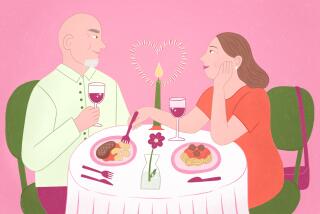Love can be a loser’s game
- Share via
The day after our first date, I received a letter grade. “A+,” she texted.
We had gone from the Internet to real life in two days, and one 10-hour first date had me hooked. I actually had been hooked hours before when nearing 2 a.m. she was in the midst of a rant defending the length of Peter Jackson’s “The Hobbit” and I interrupted it with a kiss.
She recalled the moment at brunch on our second date. “I was talking about ‘The Hobbit’ like a crazy person, and I thought this guy is either going to run or kiss me, and you kissed me.” My mind keyed in on the either/or phrasing, which implied that she too had been anticipating the kiss. We were in tune.
And I was already getting ahead of myself.
She wasn’t, for instance, a gamer, but she did have a Nintendo Wii, which I spied at her apartment before we took off for brunch and an afternoon at the Getty Villa. My mind ran through an internal catalog of the games that we could play together, and I envisioned an evening when I’d be losing to her in “Mario Kart.” It’s a game in which competitiveness takes a back seat to goofiness, and I thought it a sure thing that our dates would soon consist of hanging out, ordering in, watching old “Buffy” episodes and playing video games.
Days later she called and unexpectedly put an end to it.
When a budding relationship appears to be in the all-things-excitement stage, the reason for calling it off truly makes sense only to the person doing the ending. There was no bitterness or anger on the receiving side, but there was the slow, dooming realization that I felt different around this girl, that I believed she made five years of awkward online-dating attempts worth it.
It may be unattractive to admit this, but I thought when we hung up the phone that I would probably allow her to walk back into my life anytime, no questions asked, for as long as I remained single. Thus, the days ahead were going to be long. So I would game, I told myself, to heal a broken heart.
In the past I dealt with rejection by taking solo trips to Disneyland or turning to my music collection. But video games would be better than records or an amusement park — a straight plug into another world. Why hadn’t I thought of this before?
I turned to “Animal Crossing: New Leaf,” the Nintendo 3DS life simulator in which you live among a gaggle of adorable animals and build a town largely from the ground up. You create an avatar, you fish, you collect bugs, you dig for dinosaur fossils and you make friends with talking with mice and cats.
You can even send these mice and cats letters. I wrote Broccolo, a blue-furred mouse, and asked if he had some advice for dealing with rejection. Broccolo suggested we spend a day “fruit-picking.”
That’s when it became clear that “Animal Crossing: New Leaf” was not going to help me get over a broken heart.
So I jumped to “Fire Emblem: Awakening,” also on the 3DS.
This was risky. “Fire Emblem,” despite its fantasy-world setting, places a premium on relationships. Moments after booting up, I watched a character named Nah, a half-human, half-dragon, flirting. She was telling my sword master how much she enjoyed human company. This wasn’t going to work, either.
I thought about revisiting “Halo 4” or “Far Cry 3” but was ultimately turned off because most images of women in those games feel hatched from adolescent-minded grown men.
So I decided to give “Remember Me” a shot. Set in a future France, one where memories are currency, the sci-fi plot takes risks in how much hatred it directs toward the privileged class. Good. Sociopolitical.
Even though the game’s point of view has a tendency to find itself resting near the hips of female protagonist Nilin, “Remember Me’s” appeal is that Nilin is able to use her cat-like abilities to steal and remix the memories of her enemies. But anytime I would get interested in Nilin’s story, “Remember Me” would resort to random, clunky fight scenes that seemed disconnected from the narrative.
Then I remembered “Cart Life.” This downloadable PC game is about the drudgery of day-to-day life. Play a single mom or a Ukrainian immigrant with a cat. In “Cart Life,” you worry about paying rent, drinking too much or whether you worked too late to get pet food before the store closed.
It turns out that it wasn’t an escape that I needed after all. I had met someone whose very presence was an escape from the mundane, and “Cart Life” was concerned only with the mundane. It was a way to fast-forward back to normality.
Is it working? I’m not sure. As an incredibly optimistic hopeless romantic, I hesitate to put her completely out of my mind and return to everyday trivialities, but at least “Cart Life” doesn’t pretend I deserve anything more.
Todd Martens covers music and video games for The Times. [email protected]
L.A. Affairs chronicles romance and relationships. Past columns and submission guidelines are at latimes.com/laaffairs. If you have comments to share or a story to tell, write us at [email protected].
More to Read
Sign up for The Wild
We’ll help you find the best places to hike, bike and run, as well as the perfect silent spots for meditation and yoga.
You may occasionally receive promotional content from the Los Angeles Times.











